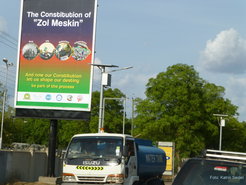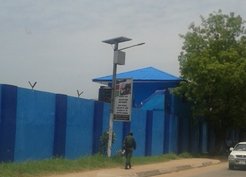South Sudan’s and Somaliland’s Constitutional Genesis in the Context of Legal Pluralism

Katrin Seidel's research and Habilitation project focused on South Sudan’s and Somaliland’s constitutional genesis in the context of legal pluralism.
The plural legal realities of both (post-)conflict settings leave the emerging states with the demanding tasks of negotiating the idea of the ‘sovereign territorial state’ among the many diverse social actors and formulating a common legal framework incorporating existing local normative orders. In order to better understand how new forms of statehood emerge as the result of negotiation processes between and among local, national, and international actors, Seidel posed the following research questions: What is the institutional design for the negotiation spaces in which manifold legal perceptions and values interact? How and to what extent are the local plural normative realities reflected in the legal frameworks, particularly in pluralistic judicial bodies? How does the state acknowledge diverse local judicial institutions and represent itself ideologically and organizationally in relation to them?

The research project is directed towards three intertwined issues:
Constitution making and international assistance in the emerging states
The study focused on the constitution-making efforts of the two emerging states on the assumption that these efforts, despite existing power relations, reflect a struggle to negotiate different beliefs, identify mutual values, and reach a societal consensus on norms and organizing principles of the state.
The constitutional drafting processes of the two states and the institutions established for this purpose – which Seidel refers to as ‘negotiation forums’ or ‘negotiation spaces’ – form a unique complex. In order to grasp the complexity of activities that accompany these processes, Seidel focused her attention not only on negotiations among the disparate South Sudanese and Somaliland actors, but on the influence of regional and international actors as well. Who negotiates the constitution, when, and how? Seidel’s research goes beyond the drafting of the constitutions, however, to also examine the normative and judicial constellations created to implement the constitutions.
Seidel’s study exemplifies the interconnectivity of the regional and international spheres, the local–global nexus where the imagined borders separating ‘internal’ and ‘external’ actors are blurred. Her observations from South Sudan and Somaliland demonstrate that international legal standards such as rule of law and access to justice are far from self-evident and unproblematic. More specifically, the South Sudan case shows that existing local–global tensions are likely to harden into enduring conflicts as different normative logics clash in the internationalized constitution-making process. By way of contrast with the South Sudan example, where international support for and intervention in the construction of a ‘nation-state’ has been rather overwhelming, the study took as its second focus the self-declared independent state of Somaliland, which is one of the rare examples of a locally led constitution-making process as part of a de facto peace- and state-making effort. Lacking international recognition, Somaliland has been more or less ignored by internationalized constitution-making efforts for almost three decades. Seidel studies these two extreme forms of (post-)conflict constitution making and their respective challenges empirically and from a comparative perspective.
State legal pluralist arrangements for balancing identity and diversity
The general question of how to deal with existing legal pluralism and identity claims in search of (legal) certainty and a sustainable societal consensus is a major bone of contention in the process of making a constitution. In navigating legal plurality as well as in dealing with the limited influence of state law, governmental actors in both countries under study have experimented with a variety of techniques of governance to co-regulate local and religious conflict resolution mechanisms. Constitutionalizing local or religious legal orders has become a common regional approach.
Since the emerging states have to deal with local normative orders that have more legitimacy than state law at the national level, one focus of the study lay on the de jure and de facto efforts to integrate ‘customary law’ and ‘traditional authority’, including their dispute resolution mechanisms and negotiation forums, into the state legal order. Seidel directed special attention to the effects that the de jure legal plural arrangement has on the actors involved and on the various normative orders. The study demonstrates that the quest for unity and diversity (and unity in diversity) through merely formal constitutional recognition of legal plurality appears to be futile. Even though constitutionally recognized legal pluralism creates certain negotiation spaces and processes, the actors involved often use the space created solely to advance the interests of their respective groups and make, if anything, only situational concessions. As long as conflicts are not seen as an opportunity to negotiate apparent normative differences with a view to identifying mutual values in light of and with respect to the different norms and beliefs, political projects of unity and/in diversity pursued by governmental actors remain unaddressed.
Post-conflict reconciliation efforts and nascent citizenship policies and practices
The positioning of the state-in-the-making also becomes visible in debates over citizenship and nationality. Thus, Seidel’s study further addresses the complex processes of negotiating ‘citizenship’ or ‘nationality’ since the respective declarations of independence in South Sudan and Somaliland. In the context of (re-)imagining and (re-)constructing the new state, citizenship policies are embedded in complex power relations, shaped not only by local collective and individual actors, but also by regional and international political actors. How does the emerging state deal, de jure and de facto, with existing plurality, e.g., with the challenging question of citizenship for cross-border and local pastoral communities, as well as for displaced persons and descendants of intra-African migrants?

